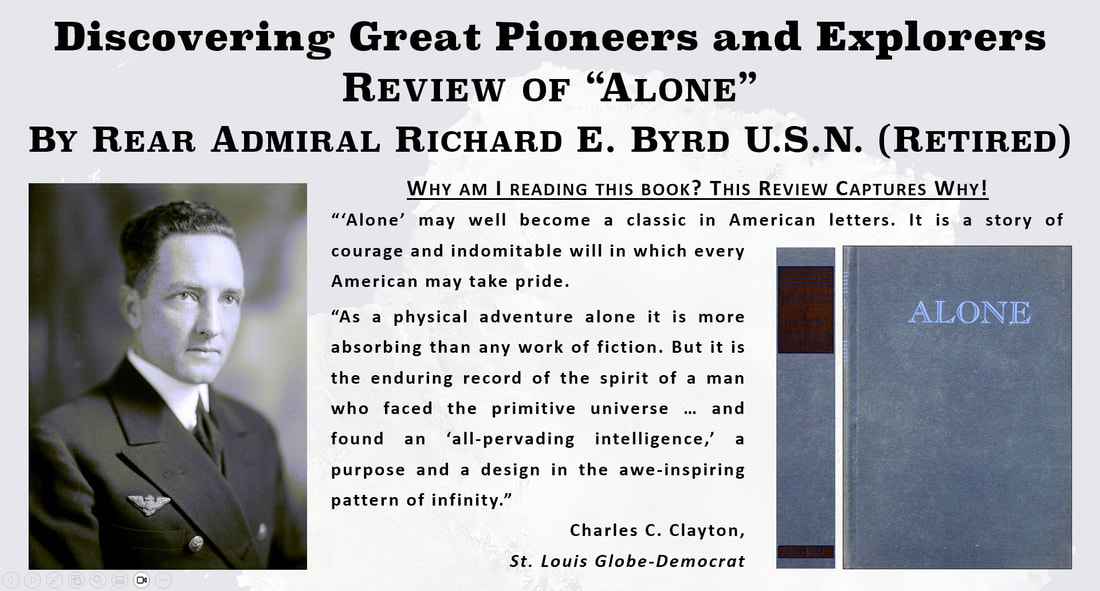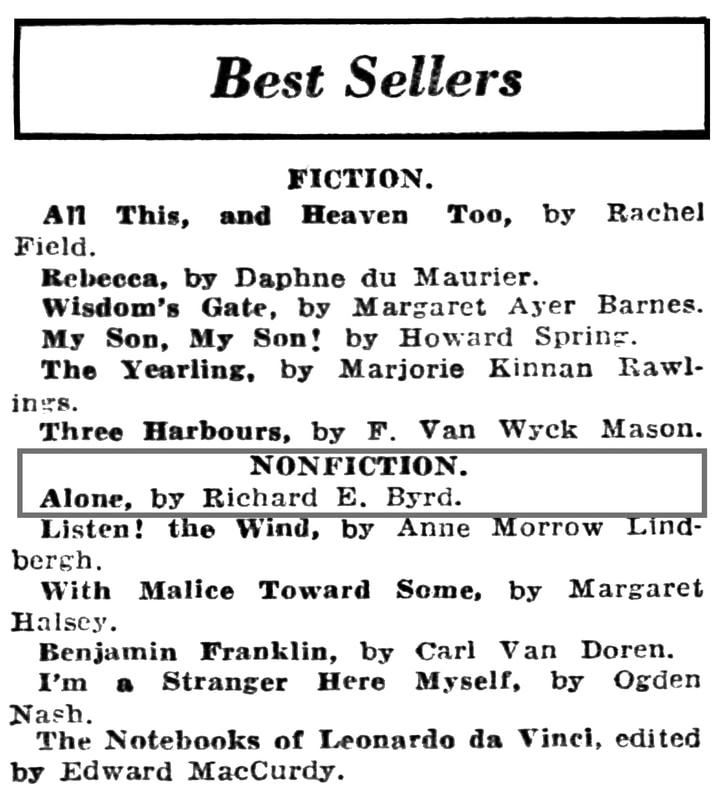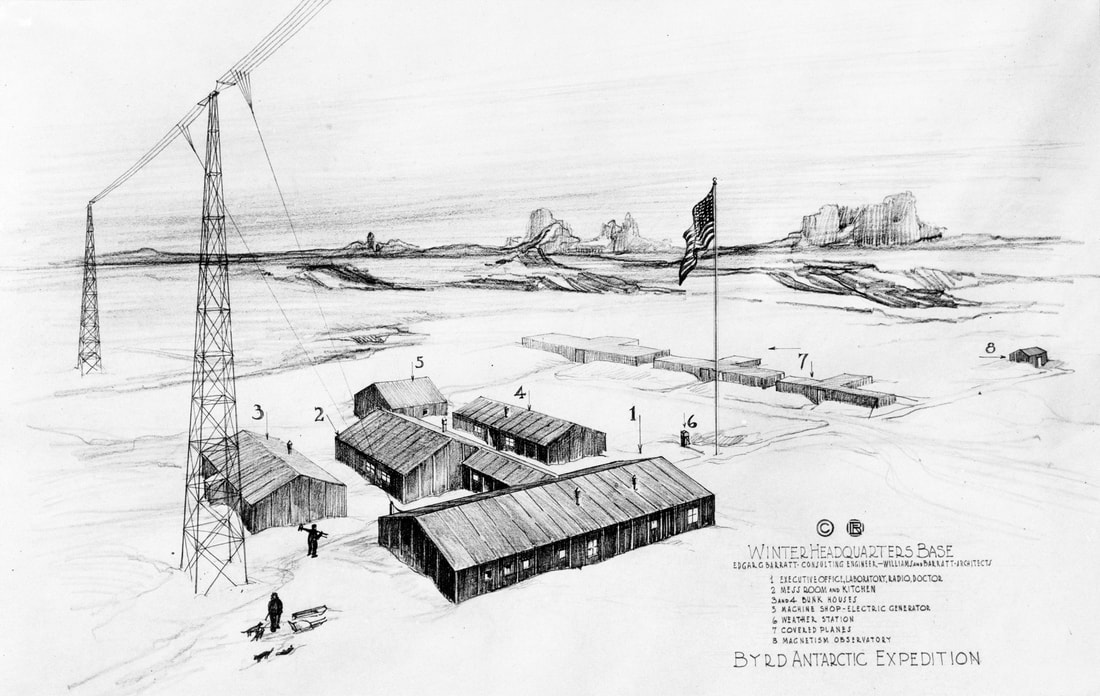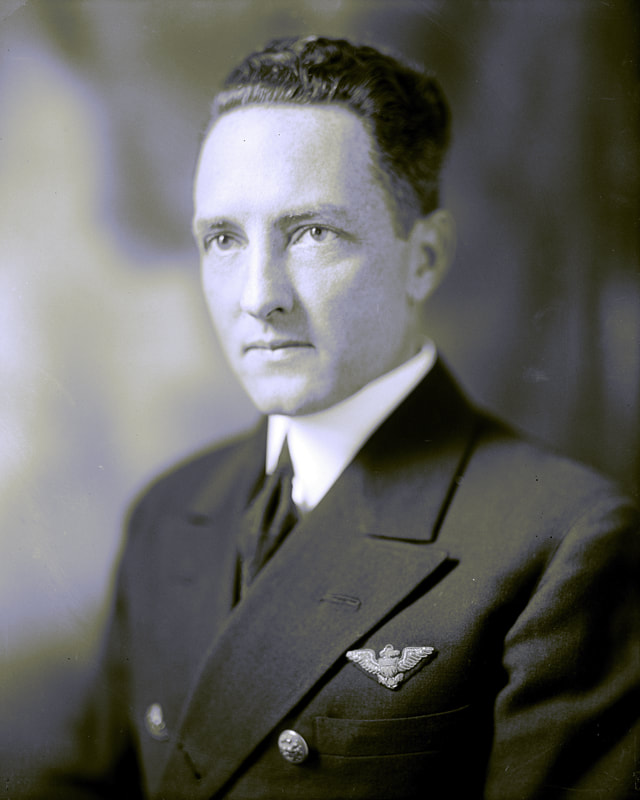A Review of "Alone" by Admiral Richard E. Byrd
|
|
Date Published: September 24, 2023
Date Modified: June 24, 2024 |
“In ‘Discovery’ Rear Admiral Richard E. Byrd told the world about his voyage and the general expedition to Little America; in ‘Alone’ he tells of the discovery of himself … as he spends months alone at Advance Base. In this cold, barren snow-covered, wind-swept spot, Rear Admiral Byrd was to undergo physical and mental battles that perhaps no man has ever before endured. Intense cold, a sprained shoulder, and insidious fumes from the stove and generator almost brought death to the admiral. …
“With restraint, simplicity, humor, and courage the admiral tells his own story—’Alone.’ ”
“With restraint, simplicity, humor, and courage the admiral tells his own story—’Alone.’ ”
“Byrd’s One-Man Expedition,” Althea Daleske The Coe College Cosmos, 1938
A Review of “Alone” by Richard E. Byrd
- Reviews of the Day: 1938–39
- Selected Insights from “Alone”
- This Author’s Thoughts and Perceptions
Reviews of the Day: 1938–39
As with Rear Admiral Richard E. Byrd’s other books published before this work—Skyward, Little America, and Discovery, “Alone” was well reviewed and well received. It also became a non-fiction best seller.
|
“This is the frank record of one of the most remarkable adventures in man’s history. … Admiral Byrd has waited four years to write the story of his experience. … How he went alone to Advance Base … to spend six months gathering data … and how he nearly died of carbon monoxide poisoning from the fumes of his stove. … [He tells] his story … without a semblance of false modesty and with an honesty and courage which compels the reader’s admiration. …
“ ‘Alone’ may well become a classic in American letters. It is a story of courage and indomitable will in which every American may take pride. As a physical adventure alone it is more absorbing than any work of fiction. But it is the enduring record of the spirit of a man who faced the primitive universe … and found an ‘all-pervading intelligence,’ a purpose and design in the awe-inspiring pattern of infinity.” Charles C. Clayton, “Admiral Byrd’s Story,” The St. Louis Globe-Democrat, 1938
|
December, 1938 Best Seller listing.
|
“Commander Byrd relates for the first time a detailed story of his lonely vigil [in Antarctica] in ‘Alone’ …Byrd has been severely criticized for the foolhardiness of the venture in isolation, but he insists it was no sudden whim. The plan had been studied in advance, … but when it developed that it would not be possible to stock sufficient supplies for three men in the base, … and when Byrd realized how maddening it would be for two men to share the vigil, he eventually saw that it was inevitable one man should do it alone. … He felt it must be him, rather than one of his men, who took the risk. …
“This is no ordinary adventure story. It is a thoroughly gripping tale, told with honesty and an amazing appreciation of the majesty of nature, even under the circumstances the explorer faced.
“ ’Alone’ will give its reader a breath-taking view of true solitude and an idea of what it’s like to stare death in the face.”
“This is no ordinary adventure story. It is a thoroughly gripping tale, told with honesty and an amazing appreciation of the majesty of nature, even under the circumstances the explorer faced.
“ ’Alone’ will give its reader a breath-taking view of true solitude and an idea of what it’s like to stare death in the face.”
Beverley Britton, “Balancing the Books,” The Richmond News Leader, 1938
“While scientific notes and observations of Nature have their value, the vivid interest of ‘Alone’ is in its revelation of the effects of isolation on a man. The life Admiral Byrd lived in Advance Base was chiefly life of the mind.
“He found his sense of values, his definition of success, and his views about man’s place in the cosmic scheme all changing.”
“He found his sense of values, his definition of success, and his views about man’s place in the cosmic scheme all changing.”
S. W., “Byrd’s Lone Vigil in Antarctic Base,” The Philadelphia Inquirer, 1938
Selected Insights from "Alone"
- Admiral Byrd Wrote the Following Contrasting His Book “Alone” with “Little America” and “Discovery”
|
“My other books have been factual, impersonal narratives of my expedition and flights. This book, on the other hand, is the story of an experience which was in considerable part subjective.
“I very nearly died before it was over. And, since my sufferings bulked so large in it and since a man’s instinct is to keep such things to himself, I did not see how I could write about Advance Base and still escape making an unseemly show of my feelings.” - Admiral Byrd Writes About the Reality of Arctic Expeditions “You might think that a man whose life carries him into remote places would have no special need for quietude. Whoever thinks that has little knowledge of expeditions.
“Most of the time they move in fearful congestion and uproar, and always under the lash of time. Nor will they ever be different, so long as explorers are not rich men and so long as exploration itself deals with uncertainties.” - Admiral Byrd on the Effects of “Celebrity” and “Social Media” |
Admiral Byrd’s account of his staying "Alone" at Advance Base in Antarctica.
|
“Once you enter the world of headlines you learn there is not one truth but two: the one which you know from the facts; and the one which the public, or at any rate a highly imaginative part of the public, acquires by osmosis.
“I happen to be privy to several of the gospel truths circulated about Advance Base. God knows, there may be others, but these could hardly be improved upon. One is that I was exiled by my own men. Another is that I went out there to do some quiet but serious drinking.
“In the past such tales would have shocked me; most certainly they would have made me mad. But not now.”
“I happen to be privy to several of the gospel truths circulated about Advance Base. God knows, there may be others, but these could hardly be improved upon. One is that I was exiled by my own men. Another is that I went out there to do some quiet but serious drinking.
“In the past such tales would have shocked me; most certainly they would have made me mad. But not now.”
- Admiral Byrd on the Effects of Isolation in Explorations
“Even at Little America I knew of bunkmates who quit speaking because each suspected the other of inching his gear into the other’s allotted space; and I knew of one who could not eat unless he could find a place in the mess hall out of sight of the Fletcherite [the practice of chewing food until it is reduced to a finely divided, liquefied mass] who solemnly chewed his food twenty-eight times before swallowing.
“In a polar camp little things like that have the power to drive even disciplined men to the edge of insanity. During my first winter at Little America I walked for hours with a man who was on the verge of murder or suicide over imaginary persecutions by another man who had been his devoted friend.
“There is no escape anywhere. You are hemmed in on every side by your own inadequacies and the crowding pressures of your associates.”
“In a polar camp little things like that have the power to drive even disciplined men to the edge of insanity. During my first winter at Little America I walked for hours with a man who was on the verge of murder or suicide over imaginary persecutions by another man who had been his devoted friend.
“There is no escape anywhere. You are hemmed in on every side by your own inadequacies and the crowding pressures of your associates.”
This Author’s Thoughts and Perceptions
I appreciated Rear Admiral Richard E. Byrd’s insight about those celebrities who enter “the headlines,” and the “truth” about such individuals as some of the public seems to acquire by osmosis. Today, social media seems to overamplify acquiring “truths” by osmosis rather than hard, knowledgeable, thinking and evaluation.
|
Admiral Byrd spent four and one-half months (April, May, June, July, and the first two weeks of August) in complete isolation in Advance Base in Antarctica—most of which were in sun-deprived darkness.
Even after the Little America crew arrived to take him “home” from his isolated base in mid-August, he was unable to make the return trip to Little America for another two months and four days because of his physical condition. Three men stayed to conduct scientific experiments and nurse him back to health. |
Library of Congress image of "Little America" with no known restrictions on usage.
|
One insight that I appreciated was Admiral Byrd’s following comment on the internal conflict between his “mind”—his rational thinking, and his “physical”—his old, repetitive and expected habits and conveniences.
- Admiral Byrd’s Thoughts on the Interaction of Mind and Body in Isolation
|
“A man can isolate himself from habits and conveniences—deliberately, as I have done; or accidentally, as a shipwrecked sailor might—and force his mind to forget. But the body is not so easily sidetracked. The body keeps on remembering.
“Habit has set up in the core of the being a system of automatic physio-chemical actions and reactions which insist upon replenishment. That is where the conflict arises. I don’t think that a man can do without sounds and smells and voices and touch, any more than he can do without phosphorus and calcium.” Alone, is a masterpiece not only because of the circumstances that surrounded Rear Admiral Richard E. Byrd—isolated in his Advance Base, but also because of his reflection on his physical and emotional wellbeing at a time when death could have taken him as easily as nodding off to sleep in the night.
|
This is the second work of Admiral Byrd that I have read and they are both excellent examples of a man who is insightful, self-deprecating and aware of his surroundings that were some of the most challenging that any man and his team could have faced. What I enjoyed the most about reading this book was its accounting of loneliness in leadership and how that might be applied in appreciating—even more—Samuel E. Morison’s story about Christopher Columbus’ voyages to the New World: Admiral of the Ocean Sea.
These are two different “Admirals” during two different eras who probably still shared some of the same beliefs, thoughts, and worries in making expeditionary command decisions. Applying this work to Columbus’ efforts enables a reader to be more accepting of both explorers’ shortcomings—seeing them as supremely dedicated, yet fallible human beings, not supermen.
Another highly recommend book from this reader.
Cheers,
- Peter E.
These are two different “Admirals” during two different eras who probably still shared some of the same beliefs, thoughts, and worries in making expeditionary command decisions. Applying this work to Columbus’ efforts enables a reader to be more accepting of both explorers’ shortcomings—seeing them as supremely dedicated, yet fallible human beings, not supermen.
Another highly recommend book from this reader.
Cheers,
- Peter E.




